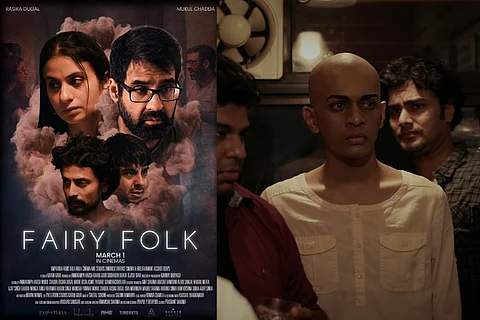
- HOMEGROWN WORLD
- #HGCREATORS
- #HGEXPLORE
- #HGVOICES
- #HGSHOP
- CAREERS
- ABOUT US
- CONTACT US

What would you do to save an ailing marriage? Some couples try to spice things up, others throw a baby into the mix. For Mohit and Ritika, the mundanity of their lives is disrupted when they invite a strange being from the woods into their home, shifting the trajectory of their relationship forever.
Written and directed by Karan Gour, ‘Fairy Folk’ is an absurdist independent film blending our urban reality with the fantastical. Its central couple, the aforementioned Mohit and Ritika, encounter a genderless humanoid creature when their car breaks down in the woods. Their first response is, understandably, fear. But when the fairy follows them home, the couple quickly accept this magical new addition to their lives. They turn it into a servant of sorts, exchanging affection with it while using it for their own benefit. It is now a waiter, a pet, and a party trick all in one.
There is something deeply disturbing about these sequences but, unexpectedly, this is not because of the creature itself. The world and characters of ‘Fairy Folk’ so readily accept the absurd that you, as an audience member, have no choice but to suspend your disbelief as well. Rather, it’s Mohit and Ritika’s treatment of the being– allowing it to be poked and prodded, exposed for the entertainment of their friends and ordered around– that feels bizarre. While the creature doesn’t react, the pleasure the couple derives from its exploitation is, at times, infuriating. And as a woman, their disrespect and disregard towards it feels all too familiar.
But for Mohit, the allure of this strange being dies when it transforms into a recreation of himself, albeit younger and better built. Now named Kabir, the creature retains Mohit’s memories while offering a fresh, new partnership to Ritika. Their relationship walks a strange line– is it still monogamy when your new partner is a reborn version of the old? And, if they do share the same core, why is it that the new feels so much better?
Mohit then finds a new fairy in the hopes of creating a new Ritika, only for the resulting transformation to be disappointed when his newly formed partner, Hansa, is a woman with manly features and a beard. This begs the question: what do we actually want from our partners? What do we need to feel fulfilled? And in Hansa’s case: what are you willing to do for someone you love? How far will you go when they don’t accept you as you are?
‘Fairy Folk’ doesn’t offer us definitive answers to these questions, and I’m glad it doesn’t. Instead, it uses a magical narrative to make us reflect on the realest parts of ourselves. The events of the movie are equal parts silly and thought-provoking; both fantastical and deeply human. No character is good or bad, and while their wants exist in the realm of the abstract, their questionable decisions speak to a frustrated, vulnerable part of the human psyche.
Delve into this weird but fascinating world and watch ‘Fairy Folk’ here.
If you enjoyed reading this, here’s more from Homegrown:
HASZNAT Is An Audio-Visual Punk Artist Redefining Non-Conformity & Creative Fluidity
Told Through VHS Tapes, 'Brown Brit' Is A Nostalgic Journey of Migration & Resilience
The Reign Of Kalmi: The Producer Behind 'Big Dawgs' Is Showing Us How To "Make Good Music"
